Young man from Mosul focuses lens on new life in Finland
28 October 2016, by Marjanna Bergman
RASEBORG, Finland – When the death threats came, Ahmed Alalousi knew it was time to run. First, he went into hiding.
His instincts were correct. Shortly afterwards, gunmen arrived at his house.
“They tortured my brother but he didn’t tell them where I was,” he recalled in an interview with UNHCR, the UN Refugee Agency.
Since hardliners had arrived in his hometown of Mosul, northern Iraq in June 2014, people he knew had slowly disappeared. One by one, fellow journalists, friends and family had been threatened, tortured and even killed.
“I had no more tears to cry.”
“A friend in my class was shot on her way home from an exam, she was the only one taking care of her poor mother,” he said. “Another classmate was killed only 10 minutes after I walked with him in the street.
“People I know were killed every day. It happened so often that I had no more tears to cry.”
Their crimes? No one really knows.
He and his friends were training to be journalists and were often seen chatting animatedly over current affairs and injustice in society. That allowed some among the group, called Daesh by locals, to paint them as enemies.
He also performed regularly with a band and organised popular cultural events with friends – other activities frowned on by the newcomers.
Together with his parents and his brother’s family, he fled Iraq in December 2014. A car journey to Baghdad took them two days as they stuck to back roads.
From there they flew to Turkey where they struggled to make ends meet. Ahmed’s visa quickly expired. Through contacts he heard that people were treated fairly and equally in Finland and that the education system was one of the best in the world.
Ahmed’s dearest wish was to be able to complete his studies. An idea formed in his head – he must get to Finland and make that a reality.
In August 2015, he took the dangerous smuggler route across the Mediterranean to Europe.
On the flimsy inflatable dinghy to Greece, he realised his life vest was false. As the vessel took in water, he thought his “last moment had come” but they made it.
A two-week journey on foot, train and people smugglers’ cars then took him through Greece, the Former Yugoslav Republic of Macedonia, Serbia, Hungary, Austria, Germany, Denmark, Sweden and finally to Finland.
“I finally felt safe,” he said, “Then I just slept. I had been walking for so long; I just wanted it to end.”
In Finland, the 24-year-old Iraqi took full advantage of the opportunities which came his way. A talented photographer and media student, he had always dreamed of following in the footsteps of his hero, American photographer Michael Shainblum. He now set about putting that into practise.
Ahmed had bought his first camera in 2012 and entered a creative art competition at university, submitting the first photo he ever took. He won first prize.
“I thought it must be a mistake,” he said, laughing. There were more competitions, more prizes and his work was shown at exhibitions in Baghdad, then in Turkey, Tunisia and Morocco.
But he was keen to do much more and knew he needed to study. He found waiting for a decision on his refugee status frustrating.
“I’m not used to sitting around doing nothing,” he said. “My camera was left behind in Turkey and Finland was so cold and dark. But people were really nice, everybody tried to help me.”
Ahmed showed staff at the reception centre where he was staying some of the photos he had taken on his phone. They saw he had talent and called a local photographer Kjell Svenskberg.
Svenskberg asked Ahmed to go to his shop in the small coastal town of Ekenäs, about 90 km from Helsinki for a visit and liked what he saw.
“My employees were so impressed by Ahmed’s photos, they actually said that our photography is very similar,” recounted Svenskberg, 41.
Svenskberg took the young Ahmed under his wing. “I guess this was in a way my way of contributing, just being a friend, like taking Ahmed to a football game and out taking photos together. We both love photography and football so we are a perfect match.”
Svenskberg was acutely aware of what Ahmed had gone through to reach Finland. “I had seen what was happening on the news. It made me feel powerless. I was angry at the people that didn’t want to help.
Ahmed’s experience reminded Svenskberg of his own father’s stories about war.
“My father was only a small child living in Helsinki when bombs were falling over the city. He still dreams about it. He was evacuated and sent to Sweden as a war child. It could happen to anyone of us, we are no different.”
As word of Ahmed’s talent spread, a new life opened up. He landed his first job at the Finnish Museum of Photography, displayed his work at three photo exhibitions and collaborated with the rapper Qruu. Together they made a music video and tour schools to talk about the refugee crisis and what it means to be a refugee.
Nine months after arriving, Ahmed received news that his application for asylum had been granted. Finally, he was able to move out of the reception centre into his own rented flat and attend Finnish classes, the first step to getting back to his studies.
He still hopes to return to Mosul one day, together with his family, who are still waiting in Turkey for the war to end. “I miss my whole city, the people there, my old memories. I feel so far away from it.”
Page 3 of 5
-

Football and fika co-organized by refugees in Sweden marks World Refugee Day
21.06.2021In the 30 degree heat, Faridah Luanda, 23, rushed around the football pitch and accommodation centre in northern Stockholm to make sure everything was in order to celebrate this year’s World Refugee Day. “This day is very important in our lives,” Faridah explained. “I celebrate the strength and courage of […]
-
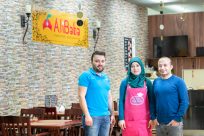
UNHCR: Despite some remaining challenges, refugees still optimistic about their future in the Baltic countries
09.06.2021Estonia, Latvia and Lithuania are countries where refugees can thrive, not just survive. UNHCR survey reveals willingness of refugees to start a new life and integrate in the society, but also remaining challenges.
-

UNHCR co-organize Lithuanian Diversity Conference
18.05.2021On 25 May, UNHCR Representation for the Nordic and Baltic Countries will co-organize the annual conference of the Lithuanian Diversity Charter together with the NGO SOPA and the Office of the Equal Opportunities Ombudsperson. The conference will focus on the impact of COVID-19 on the development of diversity and inclusion […]
-

Swedish organization Yalla Trappan helps refugee women enter labour market
29.03.2021When Fatme Ibrahim arrived in Sweden on a November night 28 years ago after having fled from Lebanon, she felt very cold and very alone. She arrived with her husband and their young children – and without any formal work experience. Today, Fatme works at Yalla Trappan, a social enterprise […]
-
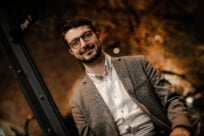
Helping vulnerable children to find their inner hero
24.02.2021Syrian refugee wins UNHCR Innovation Award for an inventive project that helps vulnerable children overcome trauma linked to past experiences.
-

Corona causes anxiety – also for refugees
15.02.2021The global corona pandemic leaves its mark on the lives of refugees in Estonia. UNHCR investigated how they cope with the crisis.
-

UNHCR congratulates Jonava on joining the Council of Europe’s network of “Intercultural Cities”
28.01.2021UNHCR, the UN Refugee Agency, welcomes Jonava’s membership of the Council of Europe’s Intercultural Cities Programme. Jonava is not only the first Lithuanian but also the first Baltic city to join the network. The CoE Intercultural Cities network provides expertise and support to cities to exchange experiences on how to […]
-
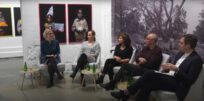
Estonia helps refugees make a “tiger leap“
20.11.2020A global advocate for digital development is assisting refugees from Uganda to Ukraine to learn IT skills.
-
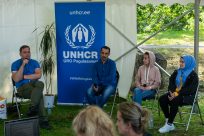
Refugees speak at the Opinion Festival: “Estonians, let’s be friends!”
25.08.2020This year at the annual Paide Opinion Festival, refugees living in Estonia talked to UNHCR about where they feel they belong.
-
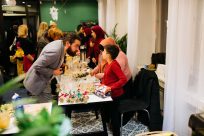
Estonia: Where do refugees belong?
14.08.2020Kari Käsper and Karolis Žibas: The number of refugees coming to Estonia is decreasing. We should do more to welcome them.
